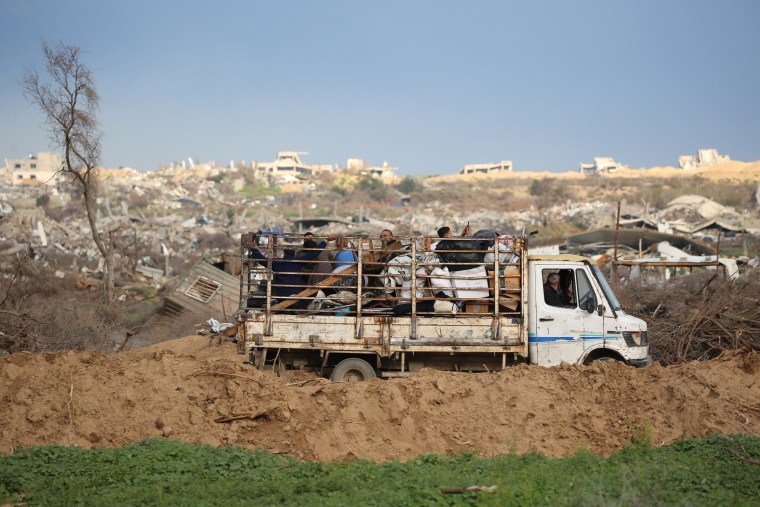Israeli forces were withdrawing from a key corridor that bisects the Gaza Strip on Sunday as part of Israel’s commitments under a tenuous ceasefire deal with Hamas.
“We are preparing to implement the agreement regarding Netzarim axis,” the Israel Defense Forces said in a statement.
The truce, however, faces a major test over whether the sides can negotiate its planned extension amid external pressures, including President Donald Trump’s controversial Gaza relocation plan, and tensions between Israel and Saudi Arabia.
Israel had agreed to remove its forces from the 4-mile Netzarim corridor, a strip of land that divides northern Gaza from the south, which Israel has used as a military zone during the war.
At the start of the ceasefire last month, the Israeli military began allowing Palestinians to cross Netzarim to head to their homes in the war-battered north, sending hundreds of thousands streaming across Gaza on foot and by car.

On Sunday, cars heaped with belongings, including water tanks and suitcases, headed north on a road that crosses Netzarim. Under the ceasefire deal, Israel is supposed to allow the cars to cross through uninspected, and there did not appear to be troops in the vicinity of the road, The Associated Press reported.
Withdrawing forces from the area will fulfill another commitment to the deal, which paused the 15-month war.
Troops remain along Gaza’s borders with Israel and Egypt, and a full withdrawal is expected to be negotiated in a later stage of the truce.
But the ceasefire is fragile, and its extension is not guaranteed. It has faced repeated obstacles and disagreements between the sides, which appear to have made little progress on negotiating the deal’s second phase meant to extend the truce and lead to the release of more Israeli hostages held by Hamas.
The truce also faces many external challenges, including Trump’s proposal to relocate the population of Gaza and take ownership of the Palestinian territory.
Israel has expressed openness to the idea, while Hamas, the Palestinians and the broader Arab world have rejected it outright.
Tensions flared again Sunday when Saudi Arabia condemned Israeli Prime Minister Benjamin Netanyahu’s remark that Palestinians could establish a state in Saudi Arabia, citing the country’s large size. Netanyahu’s comments, made in a Channel 14 interview last week, sparked backlash and further strained relations between the two nations, which before the war had appeared to have been moving toward a landmark normalization agreement.
Saudi Arabia said his remarks “aim to divert attention from the successive crimes committed by the Israeli occupation against our Palestinian brothers in Gaza, including the ethnic cleansing they are being subjected to.”
Qatar, a key mediator in Gaza ceasefire negotiations, also condemned the comments Sunday, describing them as “provocative.” The United Arab Emirates, which reached a diplomatic recognition deal with Israel in 2020, also condemned Netanyahu’s remarks late Saturday.
While Trump’s plan is saddled with moral, legal and practical obstacles, it may have been proposed as a negotiation tactic to try to ratchet up pressure on Hamas or as an opening gambit in a bargaining process aimed at securing a normalization deal between Israel and Saudi Arabia. Saudi Arabia’s response to Netanyahu’s comments would appear to have rattled such a plan.
At home, Netanyahu is also under heavy pressure from his far-right political allies to resume the war after the first phase so that Hamas, which carried out the deadliest attack on Israelis in their history, can be defeated. He faces pressure from Israelis who are eager to see more hostages return home, especially after the gaunt appearances of the three male captives freed Saturday stunned the nation.
Netanyahu was sending a delegation to Qatar, a key mediator in talks between the sides, but the mission included low-level officials, sparking speculation that it won’t lead to a breakthrough in extending the truce. Netanyahu is also expected to convene a meeting of key Cabinet ministers this week on the second phase of the deal.
According to local health officials, close to 48,000 people have died in the war in Gaza, which was triggered by Hamas’ attack on Oct. 7, 2023, when 1,200 were killed and 251 were taken hostage.